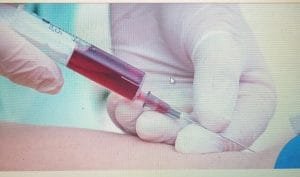
- There are about 9,000-12,000 living with Haemophilia in Nigeria – World Haemophilia Foundation
- To prevent mortality in haemophilic patients, early enrolment into a haemophilia treatment centre is essential – Haematologist
By Gom Mirian
The World Haemophilia Day is celebrated on April 17 to raise awareness of Haemophilia and other inherited bleeding disorders. Additionally, it provides an opportunity to talk about the disease with friends, family, coworkers, and others as well as to provide assistance to Haemophilia patients.
The World Federation of Haemophilia (WHF) birthed the day observed on April 17th each year. This year’s event is themed “Access for All: Prevention of Bleeds as the Global Standard of Care.”
Haemophilia is mostly inherited from parents and is a rare blood disorder caused by defect in the genes responsible for the production of normal factors eight, nine or eleven.
People suffering from this condition do not have the necessary clotting factors, which in turn makes them bleed for longer, which can even lead to death.
Caused by an inherited genetic mutation, one should get tested for haemophilia when nosebleeds take long to stop, wound bleeds don’t heal soon, gums bleed, skin bruises easily, and stiffness & pain in and around joints which could be caused due to internal bleeding.
It occurs primarily in males and only rarely, in females under peculiar circumstances. There are two main types of haemophilia: haemophilia A and haemophilia B. In haemophilia A there is a lack or total absence of clotting factor VIII (eight).
In haemophilia B there is a lack or total absence of clotting factor IX (nine).
In an interview with Africa Health Report, AHR, Dr. Okolie Ifechukwude, Consultant Haematologist at Benue State University Teaching Hospital, Makurdi, lamented the poor level of awareness, inadequate data and delayed diagnosis as factors worsening treatment for people with haemophilia in Nigeria.
“The Haemophilia Foundation of Nigeria, a non-governmental organisation involved in haemophilia care in Nigeria for more than 15 years, has only about 400 patients registered with them.
“And it is believed that there are more than 10,000 undiagnosed cases.
“Some tertiary institutions with specialist care located in urban areas where you would think people will have more awareness have less than 50 patients enrolled for care in their centres.
“The usual scenario is that patients and/or their parents do not understand the abnormal bleeding at first, and so they are prone to unhelpful suggestions, advice and care from different sources.
“Until they encounter a doctor or healthcare provider who is able to recognise that an abnormal bleed in a child, especially a boy, maybe haemophilia and refer them appropriately to a haematologist”, she said.
Okolie Ifechukwude, said: “Adequate data on the prevalence of haemophilia or death rates in Nigeria are poor mainly because a large number of patients remain undiagnosed for several reasons.
“Worldwide, haemophilia is described as a rare disease; with haemophilia, A occurring as 1 in 10,000 live male births and haemophilia B as 1 in 20,000-30,000 live male births and it may not be any different in Africa or Nigeria.
“Based on the World Haemophilia Foundation estimation, there may be about 9,000-12,000 or more people living with Haemophilia in Nigeria.
“But if untreated, haemophilia is fatal, and most patients with severe disease may not live up to the first decade.”
According to her, “Treatment is for life because as long as they cannot make these factors themselves, they will always bleed so they are maintained on these concentrates for life.
“Factor concentrates are imported so the cost of treatment is very high, often running into hundreds of thousands of naira to get the complete dose to treat one bleeding episode.
“The cost increases if treatment extends for weeks or if a family is managing more than one haemophilia child, so it is not convenient even for those with good socio-economic status.
She added that curing haemophilia “at the moment, is not remediable but those managed with replacement therapy with factor concentrates can have near normal lives like those without the disease and research is still ongoing for new modalities of treatment that can achieve cure”.
She noted that haemophilia is best done by premarital genetic screening and counselling to avoid the birth of haemophilic children.
“Intending couples with a history of bleeding disorder whether in them or in their families should undergo coagulation screenings in order to confirm their clinical states and make informed decisions as it concerns childbearing.
She suggested that to prevent mortality in haemophilic patients, enrolment into a haemophilia treatment centre as early as possible is essential.
Also, “Improved diagnostic tools and instruments in referral hospitals so that patients with bleeding disorders are properly identified and managed accordingly,” she said.


